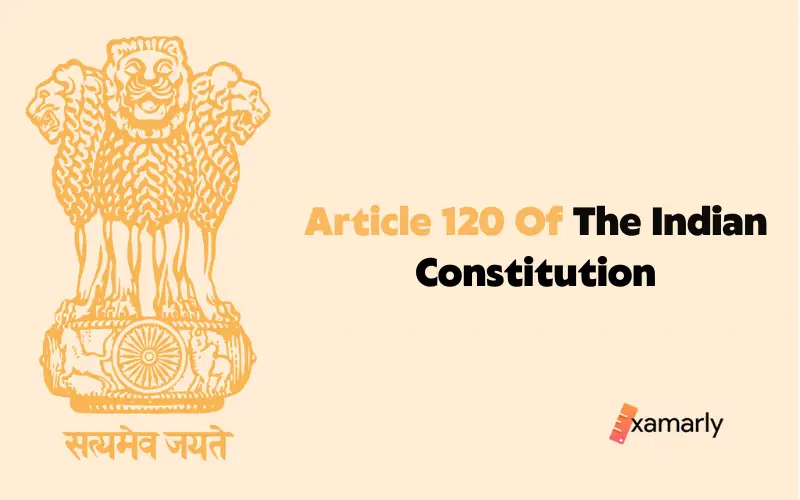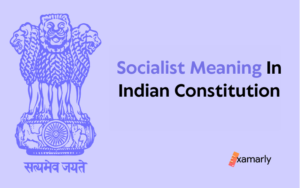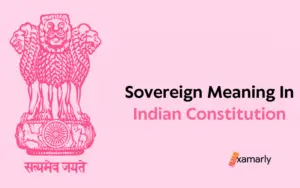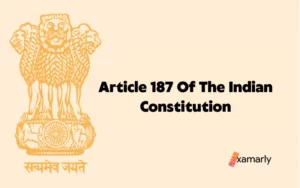The Indian Constitution provides constitutional provisions by means of various articles that resonate its principles and policies. Article 120 of the Indian Constitution is one such article that deals with the language that is to be used as a medium of exchange in the Parliament.
Read on to explore what Article 120 of the Indian Constitution is all about.
- What Does Article 120 Of The Indian Constitution Deal With?
- Understanding Article 120 Of The Indian Constitution In-Depth
- Summing Up
- FAQs
- What Is Article 120?
- Which Article Says That Business In Parliament Shall Be Transacted In Hindi Or English?
- Which Draft Article Took The Shape Of Article 120 Of The Indian Constitution?
- When Was Draft Article 99 Debated And Adopted?
- What Was The Suggested Modification Discussed In The Constituent Assembly Regarding Article 120?
- Who Can Permit A Member To Address The House In His Mother-tongue?
What Does Article 120 Of The Indian Constitution Deal With?
The language to be used when proceedings are held in the Parliament needs to be defined and uniform. This is what Article 120 is all about. In the Indian Constitution, it is stated as follows:
“120. Language to be used in Parliament
(1) Notwithstanding anything in Part XVII, but subject to the Article 348, business in Parliament shall be transacted in Hindi or in English: Provided that the Chairman of the Council of States or Speaker of the House of the People, or Person acting as such, as the Case may be, may permit any member who cannot adequately express himself in Hindi or in English to address the House in his mother tongue
(2) Unless Parliament by Law otherwise provides, this article shall, after the expiration of a period of fifteen years from the commencement of this Constitution, have effect as if the words or in English were omitted therefrom”
Understanding Article 120 Of The Indian Constitution In-Depth
As mentioned above, provisions of Article 120 of the Indian Constitution are concerned with the medium of communication during the proceedings of the houses that constitute the Parliament. The article includes these provisions in the form of two clauses.
Clause (1) of Article 120 clarifies that the conduct of business within the confines of the Parliament must be conducted either in Hindi or in English language despite anything that has been mentioned in Part XVII of the Constitution. However, this must be subject to Article 348. In addition to that, any member who might not bell well versed in the above mentioned languages can be allowed to voice out their thoughts in their mother tongue. The authority to allow this exception lies in the hands of the Chairman of the Council of States, i.e. the Rajya Sabha, or Speaker of the House of the People, i.e. the Lok Sabha. Any person substituting for the responsibilities of the above authorities may also allow the addressing in mother tongue by a member in certain instances.
Clause (2) of the article highlights that unless specifically stated otherwise by the Parliament by means of a law, this article will take effect once fifteen years have passed since the beginning of this Constitution without the words “or in English.”
Related Article: Article 76 Of The Indian Constitution: Attorney General Of India
Summing Up
Keeping in mind the crucial proceedings that are a routine procedure of the Parliament, clarity of thought and expression is of utmost importance. Therefore, a primary language or languages need to be defined for effective communication.
Provision under Article 120 states that the language for communication could be Hindi, English, and mother tongue in some cases. In addition to that it also mentions that after fifteen years from the beginning of this Constitution, this article shall take force as if the words “or in English” were excluded therefrom. This is unless Parliament provides differently by means of any law.
FAQs
What Is Article 120?
Article 120 talks about the language to be used in Parliament.
Which Article Says That Business In Parliament Shall Be Transacted In Hindi Or English?
The transaction of business in Parliament either in Hindi or English language comes under the purview of Article 120.
Which Draft Article Took The Shape Of Article 120 Of The Indian Constitution?
Article 120 took its form from Draft Article 99.
When Was Draft Article 99 Debated And Adopted?
Draft Article 99 which later came to be known as Article 120 of the Indian Constitution was debated and adopted on the same day. The Assembly took into consideration the suggested amendment, held a discussion and eventually adopted the article on September 17, 1949.
What Was The Suggested Modification Discussed In The Constituent Assembly Regarding Article 120?
An assembly member suggested changing clause (1) of Article 120. He wanted an amendment of the Draft Article to substitute Bengali or any other regional language for Hindi and English. He pointed out that members of Parliament might be forbidden from speaking in their mother tongue. This was because the proviso to clause (1) granted the Speaker of the House discretion to allow the use of regional languages. Later, the member withdrew his amendment from discussion.
Who Can Permit A Member To Address The House In His Mother-tongue?
The authority to permit a member to address the house in his mother-tongue is held by the Chairman of the Council of States, i.e. the Rajya Sabha, or Speaker of the House of the People, i.e. the Lok Sabha, or any person substituting for the responsibilities of the above authorities in certain instances.






